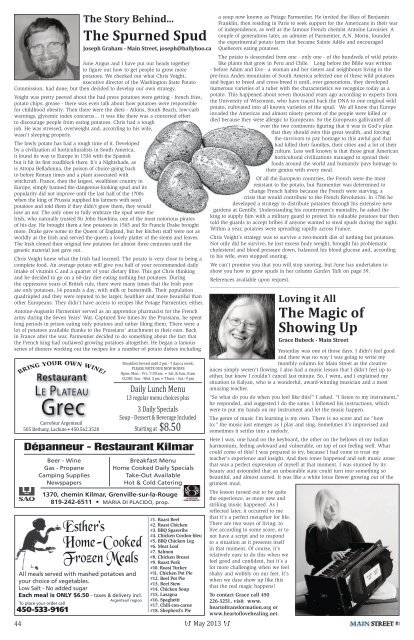Philippa Murray Philippa Murray
1 - Main Street
1 - Main Street
- No tags were found...
Create successful ePaper yourself
Turn your PDF publications into a flip-book with our unique Google optimized e-Paper software.
The Story Behind...<br />
The Spurned Spud<br />
Joseph Graham - Main Street, joseph@ballyhoo.ca<br />
June Angus and I have put our heads together<br />
to figure out how to get people to grow more<br />
potatoes. We checked out what Chris Voight,<br />
executive director of the Washington State Potato<br />
Commission, had done, but then decided to develop our own strategy.<br />
Voight was pretty peeved about the bad press potatoes were getting - french fries,<br />
potato chips, grease - there was even talk about how potatoes were responsible<br />
for childhood obesity. Then there were the diets - Atkins, South Beach, low-carb<br />
warnings, glycemic index concerns… it was like there was a concerted effort<br />
to discourage people from eating potatoes. Chris had a tough<br />
job. He was stressed, overweight and, according to his wife,<br />
wasn’t sleeping properly.<br />
The lowly potato has had a rough time of it. Developed<br />
by a civilization of horticulturalists in South America,<br />
it found its way to Europe in 1536 with the Spanish<br />
but it hit its first roadblock there. It’s a Nightshade, as<br />
is Atropa Belladonna, the poison of choice going back<br />
to before Roman times and a plant associated with<br />
witchcraft. France, then the largest, wealthiest country in<br />
Europe, simply banned the dangerous-looking spud and its<br />
popularity did not improve until the last half of the 1700s<br />
when the king of Prussia supplied his farmers with seed<br />
potatoes and told them if they didn’t grow them, they would<br />
lose an ear. The only ones to fully embrace the spud were the<br />
Irish, who naturally trusted Sir John Hawkins, one of the most notorious pirates<br />
of his day. He brought them a few potatoes in 1565 and Sir Francis Drake brought<br />
more. Drake gave some to the Queen of England, but her kitchen staff were not as<br />
worldly as the Irish and served the queen a lovely platter of the stems and leaves.<br />
The Irish cloned their original few potatoes for almost three centuries until the<br />
genetic material just gave out.<br />
Chris Voight knew what the Irish had learned. The potato is very close to being a<br />
complete food. An average potato will give you half of your recommended daily<br />
intake of vitamin C and a quarter of your dietary fibre. This got Chris thinking<br />
and he decided to go on a 60-day diet eating nothing but potatoes. During<br />
the oppressive years of British rule, there were many times that the Irish poor<br />
ate only potatoes, 14 pounds a day, with milk or buttermilk. Their population<br />
quadrupled and they were reputed to be larger, healthier and more beautiful than<br />
other Europeans. They didn’t have access to recipes like Potage Parmentier, either.<br />
Antoine-Augustin Parmentier served as an apprentice pharmacist for the French<br />
army during the Seven Years’ War. Captured five times by the Prussians, he spent<br />
long periods in prison eating only potatoes and rather liking them. There were a<br />
lot of potatoes available thanks to the Prussians’ attachment to their ears. Back<br />
in France after the war, Parmentier decided to do something about the fact that<br />
the French king had outlawed growing potatoes altogether. He began a famous<br />
series of dinners working out the recipes for a number of potato dishes including<br />
Carrefour Argenteuil<br />
505 Bethany, Lachute • 450.562.3520<br />
Breakfast Served until 2 pm - 7 days a week:<br />
PLEASE NOTE OUR NEW HOURS<br />
Open: Mon. - Fri.: 7:30 am • Sat. & Sun.: 8 am<br />
CLOSe: Sun. - Wed. 3 pm • Thurs. - Sat.: 9 pm<br />
Daily Lunch Menu<br />
13 regular menu choices plus<br />
3 Daily Specials<br />
Soup - Dessert & Beverage Included<br />
Starting at $8.50<br />
44 May 2013<br />
a soup now known as Potage Parmentier. He invited the likes of Benjamin<br />
Franklin, then residing in Paris to seek support for the Americans in their war<br />
of independence, as well as the famous French chemist Antoine Lavoisier. A<br />
couple of generations later, an admirer of Parmentier, A.N. Morin, founded<br />
the experimental potato farm that became Sainte Adèle and encouraged<br />
Quebecers eating potatoes.<br />
The potato is descended from one - only one - of the hundreds of wild potatolike<br />
plants that grow in Peru and Chile. Long before the Bible was written<br />
- before Adam and Eve - a woman and her sisters and neighbours living in the<br />
pre-Inca Andes mountains of South America selected one of these wild potatoes<br />
and began to breed and cross-breed it until, over generations, they developed<br />
numerous varieties of a tuber with the characteristics we recognize today as a<br />
potato. This happened about seven thousand years ago according to experts from<br />
the University of Wisconsin, who have traced back the DNA to one original wild<br />
potato, cultivated into all known varieties of the spud. We all know that Europe<br />
invaded the Americas and almost ninety percent of the people were killed or<br />
died because they were allergic to Europeans. So the Europeans gallivanted all<br />
over the two continents figuring that it was in God’s plan<br />
that they should own this great wealth, and forcing<br />
the survivors to pay homage to this awful god that<br />
had killed their families, their cities and a lot of their<br />
culture. Less well known is that those great American<br />
horticultural civilizations managed to spread their<br />
foods around the world and humanity pays homage to<br />
their genius with every meal.<br />
Of all the European countries, the French were the most<br />
resistant to the potato, but Parmentier was determined to<br />
change French habits because the French were starving, a<br />
crisis that would contribute to the French Revolution. In 1786 he<br />
developed a strategy to distribute potatoes through his extensive new<br />
gardens at Gentilly. Understanding his countrymen’s mentality, he asked the<br />
king to supply him with a military guard to protect his valuable potatoes but then<br />
told the guards to accept bribes if anyone wanted to steal spuds during the night.<br />
Within a year, potatoes were spreading rapidly across France.<br />
Chris Voight’s strategy was to survive a two-month diet of nothing but potatoes.<br />
Not only did he survive, he lost excess body weight, brought his problematic<br />
cholesterol and blood pressure down, balanced his blood glucose and, according<br />
to his wife, even stopped snoring.<br />
We can’t promise you that you will stop snoring, but June has undertaken to<br />
show you how to grow spuds in her column Garden Talk on page 39.<br />
References available upon request.<br />
Yesterday was one of those days. I didn’t feel good<br />
and there was no way I was going to write my<br />
monthly column for Main Street as the creative<br />
juices simply weren’t flowing. I also had a music lesson that I didn’t feel up to<br />
either, but knew I couldn’t cancel last minute. So, I went, and I explained my<br />
situation to Kalyan, who is a wonderful, award-winning musician and a most<br />
amazing teacher.<br />
“So what do you do when you feel like this?” I asked. “I listen to my instrument,”<br />
he responded, and suggested I do the same. I followed his instructions, which<br />
were to put my hands on my instrument and let the music happen.<br />
The genre of music I’m learning is my own. There is no score and no “how<br />
to;” the music just emerges as I play and sing. Sometimes it’s improvised and<br />
sometimes it settles into a melody.<br />
Here I was, one hand on the keyboard, the other on the bellows of my Indian<br />
harmonium, feeling awkward and vulnerable, on top of not feeling well. What<br />
could come of this? I was prepared to try, because I had come to trust my<br />
teacher’s experience and insight. And then tones happened and soft music arose<br />
that was a perfect expression of myself at that moment. I was stunned by its<br />
beauty and astounded that an unbearable state could turn into something so<br />
beautiful, and almost sacred. It was like a white lotus flower growing out of the<br />
grimiest mud.<br />
The lesson turned out to be quite<br />
the experience, as more new and<br />
striking music happened. As I<br />
reflected later, it occurred to me<br />
that it’s a perfect metaphor for life.<br />
There are two ways of living; to<br />
live according to some score, or to<br />
not have a script and to respond<br />
to a situation as it presents itself<br />
in that moment. Of course, it’s<br />
relatively easy to do this when we<br />
feel good and confident, but it’s a<br />
lot more challenging when we feel<br />
shaky and wobbly on our feet. It’s<br />
when we dare show up like this<br />
that the real magic happens!<br />
To contact Grace call 450<br />
226-3251, visit www.<br />
heartoftransformation.org or<br />
www.heartoflovehealing.net.<br />
Loving it All<br />
The Magic of<br />
Showing Up<br />
Grace Bubeck - Main Street









